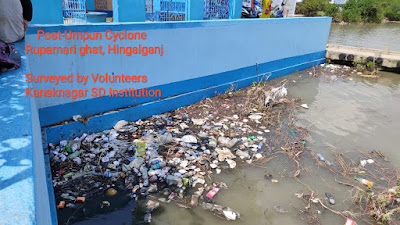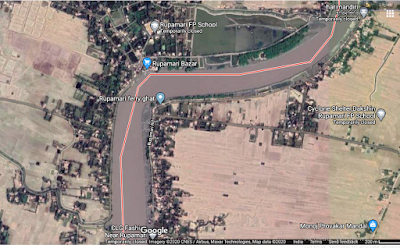Pulak Roy Chowdhury, Himangshu Debnath, Prof. Maroona Murmu, Dr. Kallol Das, Bishnu Das, Prabir Mandal, Paltan Mandal, Biplab Mandal, Bikash Mandal, Suman Chakrabarty, Kunal Mandal, Jyotirmoy Mandal, Yasin Sardar, Safina Parvin, Mallika Mukherjee, Aniruddha Mandal, Revas Mandal, Tapas Deb, Nilay Chakrabarty, Swati Basu, Tapas Kangsabanik, Aloke Das, Ashish Chanda, Rivusoumya Das, Aniket Mitra, Pushpita Polley, Sangita Mukherjee, Ananda Mukherjee, Anindya Mukherjee, Subham Paul, Supratim Mukherjee, Pritam Das Sharma, Avijit Ghosh, Prasenjit Datta. This team was further fortified by the village cleaning crew Manotosh, Ashoke, Mahadeb, Dinesh and Mahitosh.
Pre- Programme Instructions to Volunteers
The following set of instructions were circulated among all the volunteers before the programme began. This was written in Bengali and is given below as a model of common reference for future users.
ভলান্টিয়ার গাইডলাইন
প্লাস্টিকমুক্ত হিঙ্গলগঞ্জ অভিযানে যোগ দেওয়া সকল সক্রিয় সৈনিককে স্বাগত জানাই। কতগুলি সরল নির্দেশ আমরা সকলে এই দু-দিন মেনে চলব। প্রত্যেক সৈনিককে এই নির্দেশাবলীর প্রতিটি বিষয় পড়ার এবং যথাসম্ভব মেনে চলার অনুরোধ করা হচ্ছে।
নির্দেশাবলীঃ
১- ওয়ার্কিং গ্লাভস, প্রোটেক্টিভ অ্যাপ্রন, মাস্ক, গারবেজ কালেকশনের বস্তা এবং প্রোটেক্টিভ ক্যাপ আমাদের বেসক্যাম্পে থাকবে। দিনের কাজ শুরুর আগে প্রত্যেকের দ্বায়িত্ব নিজের জিনিষগুলি সংগ্রহ করা।
২- গ্লাভস এবং অ্যাপ্রন এই দুটিই ওয়াশেবল এবং একাধিকবার ব্যবহারযোগ্য। তাই প্রথমদিন কাজের শেষে সেগুলি সাবানে ধুয়ে, নিজ দ্বায়িত্বে পরদিন আবার ব্যবহার করবেন।
৩- মাস্ক এবং প্রোটেক্টিভ ক্যাপ প্রথম দিনের কাজের পর বেসক্যাম্পে নির্দিস্ট স্থানে জমা করা হবে এবং দ্বিতীয় দিন নতুন সেট নিজেদের মনে করে নিয়ে নিতে হবে।
৪- কাজ করার সময় অবশ্যই গ্লাভস পরবেন।
৫- হাওয়াই চটি কিংবা খালি পায়ে কাজ করবেন না।
৬- হালকা রঙের জামা পরে কাজ করলে গরম কম লাগবে।
৭- ইনজেকশন সিরিঞ্জ, সূচ ইত্যাদিতে হাত দেবেন না। জায়গাটিকে চিহ্নিত করে আপনার দলের বাকিদের সঙ্গে পরামর্শ করে সিদ্ধান্ত নেবেন।
৮- অন্তত দুজনের একটা করে জুটি বানিয়ে কাজ করবেন। একা কোথাও যাবেন না।
৯- মৃত কিংবা আহত কোন প্রাণীর গায়ে হাত দেবেন না।
১০- নদীর পাড়ে কাজের সময় জোয়ার-ভাটার খেয়াল রাখতে হবে।
১১- নিজেরা কাজের ফাঁকে মাঝেমধ্যে কিছু খাবার এবং জল অবশ্যই খাবেন। হিট-এক্সার্সন, ডিহাইড্রেসন এর কথা মাথায় রেখে চলবেন। মাঝেমধ্যে বিশ্রাম নিয়ে আবার কাজ করবেন।
১২- একা কেউ খুব ভারী কিছু তোলার চেষ্টা করবেন না।সেরকম কিছু করা একান্ত প্রয়োজন হলে দলের সাহায্য নিন।
১৩- খাঁড়ি অঞ্চলে কাজের সময় গাছের শিকড়, শ্বাস মূল, ভাঙা ডালপালা, ভাঙা ইটের টুকরো ইত্যাদির কথা মাথায় রাখবেন।
১৪- নদীর পাড়ের মাটি পিছল এবং স্থান বিশেষে পা গভীরে বসে যেতে পারে। আপনার দলের অভিজ্ঞ সৈনিকদের পরামর্শ মত কাজ করবেন।
১৫- কালভার্ট এর তলায় কিংবা বড় ড্রেনপাইপের ভিতরে ঢুকবেন না।
১৬- কোভিড-১৯ এর কথা মাথায় রেখে গ্রামের মধ্যে কাজ করার সময় অলি-গলির মধ্যে কিংবা কারও ঘরে প্রবেশ করবেন না।
১৭- কলকাতা থেকে আসা ভলান্টিয়ারদের থাকার ব্যবস্থা স্যান্ডেলের বিল গ্রামের সাইক্লোন শেলটারে। এখানে পরিষ্কার টয়লেট-স্নানঘর রয়েছে। বিদ্যুত নেই। ভলান্টিয়ারদের জন্য পানীয় জল এখানে মজুত আছে। মোবাইলের জন্য পাওয়ার ব্যাংক আনতে পারেন। শোবার ব্যবস্থা এই সাইক্লোন শেল্টারের ঘরে। মাটিতে পলিথিন চাদর বিছনো রয়েছে। আপনি চাইলে অতিরিক্ত ক্যাম্পিং ম্যাট আনতে পারেন। এছাড়া এক-দুই রাত ঘরের বাইরে কাটানোর মত অত্যাবশ্যক কিন্তু ন্যুনতম জিনিষপত্র আনতে ভুলবেন না। বাড়িতে আপনি নিজে যদি কোন ওষুধ রোজ খেয়ে থাকেন, তবে সেই ওষুধ সঙ্গে আনতে ভুলবেন না। একটা টর্চ থাকলে মন্দ হয় না। ওডোমস জাতীয় মশা তাড়ানোর মলম সঙ্গে রাখতে পারেন। তবে কলকাতার থেকে মশার উপদ্রব এই সাইক্লোন শেলটার অঞ্চলে বেশ কম। সঙ্গে একটা করে চা খাবার কাপ আনতে পারলে ভাল হয়।
কনকনগর সৃষ্টিধর ইনস্টিটিউসনের সক্রিয় ভলান্টিয়ার বাহিনীর পক্ষ থেকে সকলকে আন্তরিক ধন্যবাদ।
The Programme
Day 1 ( 14th June):
The volunteers from Kolkata and suburbs met in different rendezvous points and then drove to Hingalganj. After arrival at the Kanaknagar SD Institution, the Kolkata volunteers were delighted to join an ongoing programme there. At that time, a distribution of solar lights among Madhyamik examinees of the school was under progress. This was soon followed by a distribution of nutritional food among pregnant ladies of Sandeler Bill village and the vicinity. The Kolkata volunteers were thrilled and thankful to be a part of this whole process. In the evening, the team sat down together and Sri Pulak Roy Chowdhury shared his experiences from the past few weeks of working across Hingalganj and projected his vision of a greener, better, self-reliant Hingalganj. The team also discussed and finalized the action plans for the next two days.
 |
| Sri Pulak Roy Chowdhury (in blue shirt on the left) addresses the patient and queued up villagers in front of the school entrance. |
Day 2 (15th June):
In the morning, the team gathered in the school compund once again and after a quick cleaning of the school perimeters, left directly to Rupmari Ferry Ghat on the river Goureshwar.
Upon reaching the Ferry Ghat, while waiting for the boat to arrive, the volunteers started cleaning the East side of the river, on the adjacent area of the jetty. Then the team went across the river and reached the Rupmari Bazar, i.e. the Western banks of river Goureshwar. The team now split in several small units. Each of the small unit was instructed to collect by practising the 'segregation at source' method. Each unit comprised 2-3 members and they focused on collecting either PET bottles or plastic bags in their collection sacks. Rupmari Ghat and Bazar being one of the epicentres of major relief material distrbution, the plastic waste situation was really perturbing. The following are a few images of ongoing cleaning operation at Rupmari.






Members of the team, with Sri Pulak Roy Chowdhury at the helm, engaged in conversations with locals and shopkeepers of Rupamari and tried to convey the problem of plastic pollution to each and everyone they met. The locals seemed to be genuinely interested in improving the situation and promised to work together if alternative ways of waste disposal is made available there. After completion of work at Rupmari, the team gathered all the collection bags, sealed them and loaded them on the ferry and started their return journey to base camp. After a refreshing shower at base camp and a delicious lunch at the school kitchen, the team resorted to the breezy roof of the base camp ( the cyclone shelter of Sandeler Bill village) and relaxed.
 |
| Photo: Rivusoumya das |
Day 3 (16th June):
Day 3 began with an early breakfast of Muri-Alur Tarkari at the school. On this day, the team focused their attention on the closeby Bankra village. Upon reaching the village, the team divided in two separate bodies and started their cleaning work from the Bankra ground in front of the Kazi Nazrul school. Soon, the teams took two separate ways through meandering village path and covered the entire Bankra village in a circle. Once again, the team while collecting, did segregation at source and mainly picked up PET bottles and plastic bags/wraps. A few images from our cleaning programme at Bankra is placed below:
During that day's operation, Prabir Mandal kept on announcing the team's purpose and also spoke about the perils of plastic use in general. We could see that the team's uniform and disciplined approach was making an impact on the locals to some extent. Many of the residents came forward and joined hands and expressed their solidarity in future projects such as this one.
At the end of the day, we returned to our base camp once again and segregated the cumulative collection of plastic waste. After some weighing and calculating, we realized that we had collected 14 bags of PET bottles ( each bag weighing 5 kilos in average) and 14 bags of Plastic packing material ( each bags weighing 15 kilos in average).
We decided to store this collection in our base camp for the time being as we have plans to return to Hingalganj very soon for a follow up cleaning drive. After the completion of the second cleaning programme we will bring the garbage together to Kolkata and hand it over to a recycling unit for its last rites.
Conclusion:
We know that such cleaning programmes, no matter how frequently done, is not going to solve the problem. Keeping that in mind, we are now in the process of developing a sustainable programme that will truly make Hingalganj green, again. The following image, in the writer of this report's mind, remains the symbolic highlight of this Plastic Cleaning drive by Kanaknagar SD Institution.
In this photo we see a city volunteer providing anchor (by holding hands) to a Hingalganj volunteer while the latter leans forward to pick up plastic from a pond. True spirit of camaraderie in action! We feel certain that we are going to see many more such actions of team work and selfless service to the community in near future in Team Hingalganj.
Note:
- We shall post an up-to-date statement of accounts here in this blog in the next few days.
- We shall also share our vision regarding a clean and green Hingalganj.





























